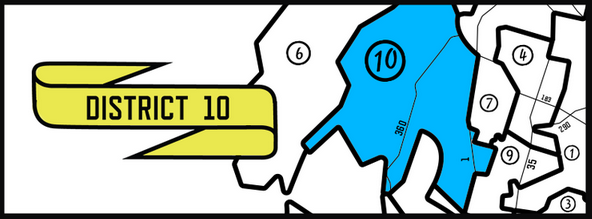Gallo touts tax cuts, bemoans traffic after first year
Tuesday, January 5, 2016 by
Jack Craver In her first year on City Council, Sheri Gallo occupied a unique place on the 11-member body.
After triumphing in a close runoff election against longtime progressive activist Mandy Dealey in December 2014, Gallo was widely perceived as one of the three right-leaning members of the new 10-1 Council. Although she repeatedly rebuked partisan labels, her emphasis on fiscal conservatism throughout the campaign and her previous run as a Republican in a 2002 race for Travis County Commissioners Court were all that some needed to group Gallo in with Council members Don Zimmerman and Ellen Troxclair, both of whom are unabashed conservatives.
In an end-of-the-year interview with the Austin Monitor, however, Gallo said she was happy that her Council colleagues did not allow ideological or partisan labels to prevent them from working together. Similarly, she said that in its first year of having members who represented geographic districts, Council had not gotten bogged down in “ward politics.”
“I consider this Council’s greatest accomplishment to be that we have shown that we can connect with our individual districts, allowing us to understand and represent the geographic area of Austin we live in,” she said in an email prior to the interview. “Yet we still are able to make the policy decisions which represent the best interests of the City of Austin as a whole.”
Asked to name her greatest achievement of her freshman year, Gallo highlighted her advocacy for stricter regulations of short-term rentals as well as her support for a 20 percent homestead tax exemption. Council passed part of the short-term rental ordinance that Gallo backed and ultimately approved only a 6 percent homestead exemption, although Gallo notes that it overwhelmingly approved an additional $80,000 exemption she proposed for seniors and the disabled.
Gallo also emphasized the work she and her staff have put into talking to residents of District 10 and responding to their concerns. She and her staff, she said, attended over 100 neighborhood or homeowner association meetings during her first year in office.
There were plenty of shortcomings, however. She is disappointed that Council meetings have regularly gone late into the night when citizens are less likely to follow proceedings. In the coming year, she said, she will be an advocate for stricter “agenda management” so that meetings don’t go past 10 p.m.
In addition, Gallo said she hopes to see more affordable housing in West Austin. Although her district includes many of the city’s wealthiest neighborhoods, it is still home to poor and near-poor people who are increasingly being priced out of the area by rising property values. The city needs to add more affordable housing stock west of I-35 if it wants to combat Austin’s notorious economic segregation, Gallo said. Currently, she added, her district has only 1 percent of the city’s affordable housing units.
“There are jobs west of MoPac, but for somebody to work in those jobs, it’s impossible because of the affordability (of housing),” she said. “So unless we commit to building more affordable workforce housing in those areas, people who work in those jobs have to commute long distances.”
Furthermore, while she was happy to support a city budget that lowered property taxes for the first time in years, she said Council can stand to be more prudent with taxpayer dollars.
“Our city is blessed with being able to fund city services with property tax dollars, which are increasing because of appreciating values and the added new growth,” she said. “But this does not mean to me that we continue to increase spending without understanding that the only way to bring down the cost of living in Austin is to tighten our belts and be fiscally conservative in our spending choices.”
One area of government that Gallo believes deserves more funding is transportation, but she is pessimistic that city roads will ever catch up with the high demand that has burdened Austin with some of the worst rush hour traffic in the country. The community has been too hesitant to build necessary roads, she said, citing opposition to expanding MoPac South.
“I don’t think the traffic we have will ever get better,” she said.
Gallo did not endorse more spending on public transportation, however, saying that the city needed to evaluate its current bus system to realign it with demand. Possible solutions include smaller vehicles for routes with fewer passengers.
Above all else, Gallo emphasizes “balance” when discussing how the city should approach development and economic policy. That means balance between promoting growth and preserving the environment or the character of neighborhoods.
A fifth-generation Austinite who grew up in the Highland Park neighborhood, Gallo expressed fond memories of the smaller, quainter Austin of her childhood but is also pleased with the big city it has become.
“I love living in Austin the way it is today, except for the traffic,” she said. “It’s a vibrant community.”
You're a community leader
And we’re honored you look to us for serious, in-depth news. You know a strong community needs local and dedicated watchdog reporting. We’re here for you and that won’t change. Now will you take the powerful next step and support our nonprofit news organization?




